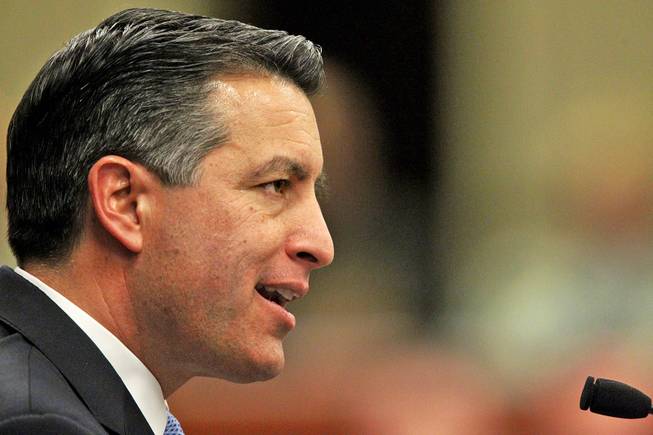
ASSOCIATED PRESS
Nevada Gov. Brian Sandoval delivers the State of the State address at the Legislature in Carson City, Nev., on Wednesday, Jan. 16, 2013.
Published Thursday, June 1, 2017 | 7 p.m.
Updated Thursday, June 1, 2017 | 9 p.m.
CARSON CITY — Republicans walked out of the Senate chambers Thursday after disagreements over Education Savings Accounts led a proposed tax on recreational pot to fail twice, highlighting a feud that threatens to derail leaders' legislative priorities with just four days remaining in the session.
Senate Bill 487 would have created a 10 percent pot tax but failed on Thursday to tally a two-thirds majority on its initial vote and upon reconsideration.
Senate Bill 544, an education funding measure, was amended to take $60 million proposed by Gov. Brian Sandoval for ESA funding and plug it into public education. Republicans walked off the floor and none voted as the bill passed the Senate 12-0.
“As of several hours ago, we had come to an agreement on the future of the Education Savings Account (ESA) program and had looked forward to closing out the session in a bipartisan fashion,” Assembly Republican leaders said in a statement Thursday. “Democrats have completely reneged on promises made.”
ESAs have been a sticking point for Republicans, who have said since January they would not support any budget that did not send money toward the program.
Sandoval requested $60 million in funding for the program that would help families pay for private school tuition.
“I'm disappointed in the result and believed we had been negotiating with democratic leadership on ESAs and their priorities in good faith,” Sandoval said in a statement Thursday. “I understand why the Republicans voted against the marijuana tax and any suggestion that their actions were anti-education is not correct.”
Since the ESA program passed, roughly 2,600 families have completed applications and 7,400 others have started applications for the funds. It was challenged in court, but the Nevada Supreme Court has ruled the concept, but not the current funding mechanism, of school vouchers to be constitutional.
Supporters say the program gives families more choice, while opponents say public money shouldn’t be directed toward private schools.
“Our Democratic majorities in both chambers have said loud and clear from day one that we believe in keeping public dollars in public schools,” Senate Majority Leader Aaron Ford and Assembly Speaker Jason Frierson said in a joint statement Thursday. “We continue to have deep concerns about how diverting public money to subsidize wealthy families would weaken our education system and threaten our children’s future.”
The pot tax bill is now dead, and the Assembly will take up the education bill next. If the funding bill makes it to Sandoval’s office, he’ll have to decide whether to sign or veto it.
Lawmakers need to come to an agreement before the end of the day Monday, when the session ends, or risk having to call a special session.
Marijuana dispensary owners in Nevada had mixed reactions to Thursday’s results, and some said they think the governor’s 10 percent tax on recreational marijuana would eventually be passed by the end of the session, if not a special session.
Andrew Jolley, who expressed concern for the tax following Sandoval’s January State of the State speech, arguing elevated legal-sale prices would benefit black market sellers, said Thursday’s developments were “more interesting than emotional.” Jolley, who owns The+Source dispensaries in Las Vegas and Henderson, said that while cutting the 10 percent tax would harm Sandoval’s education-funding plan, not having the tax would help remove illegal street sellers from the industry.
“That’s positive for the industry and consumers,” Jolley said, “and it would be bad for the black market.”
Jolley said that while he has concerns about “overtaxing” the new industry, he did not want to oppose the marijuana policy of the Nevada governor and was confident a deal incorporating the tax for his proposed budget would get done before the end of the session.
Armen Yemenidjian, president and CEO of the three Essence Cannabis Dispensary locations in the Las Vegas Valley, agreed, adding that not getting a deal done would be “a huge disservice to everybody.”
“The Department of Tax has done a great job getting us to this point,” Yemenidjian said, referring to the “early start” program for recreational sales starting July 1 under weed’s new state regulating body. “It would be a shame if we couldn’t make the most of it.”
David Goldwater, who co-owns Inyo Fine Cannabis Dispensary, has been involved in the Nevada Legislature as an assemblyman for 10 years and a lobbyist for the past 15 years. When asked what he believed was next for marijuana this session, he said “anything can happen.”
“I wouldn’t bury the body quite yet on these issues,” Goldwater said. “If it’s a good deal it’ll die twice before something happens.”
All three interviewed dispensary owners expressed a degree of frustration with the process and the idea that major legislation for the marijuana industry was tied this session to education funding in Nevada.
“That’s the kind of horse-trading that happens in government,” Jolley said. “That the ESAs, a totally unrelated issue, can determine the fate of marijuana.”
The Associated Press contributed to this report.
